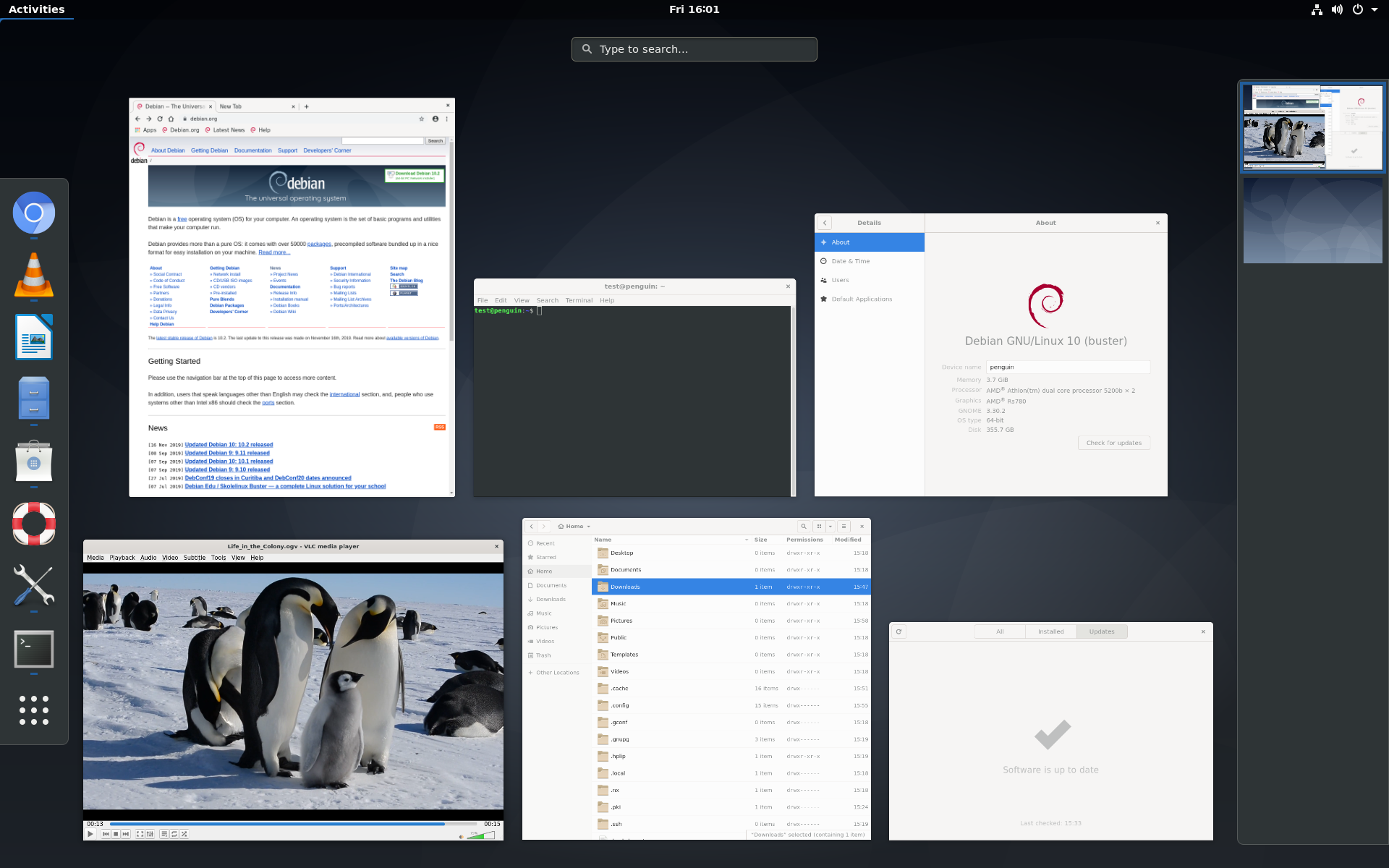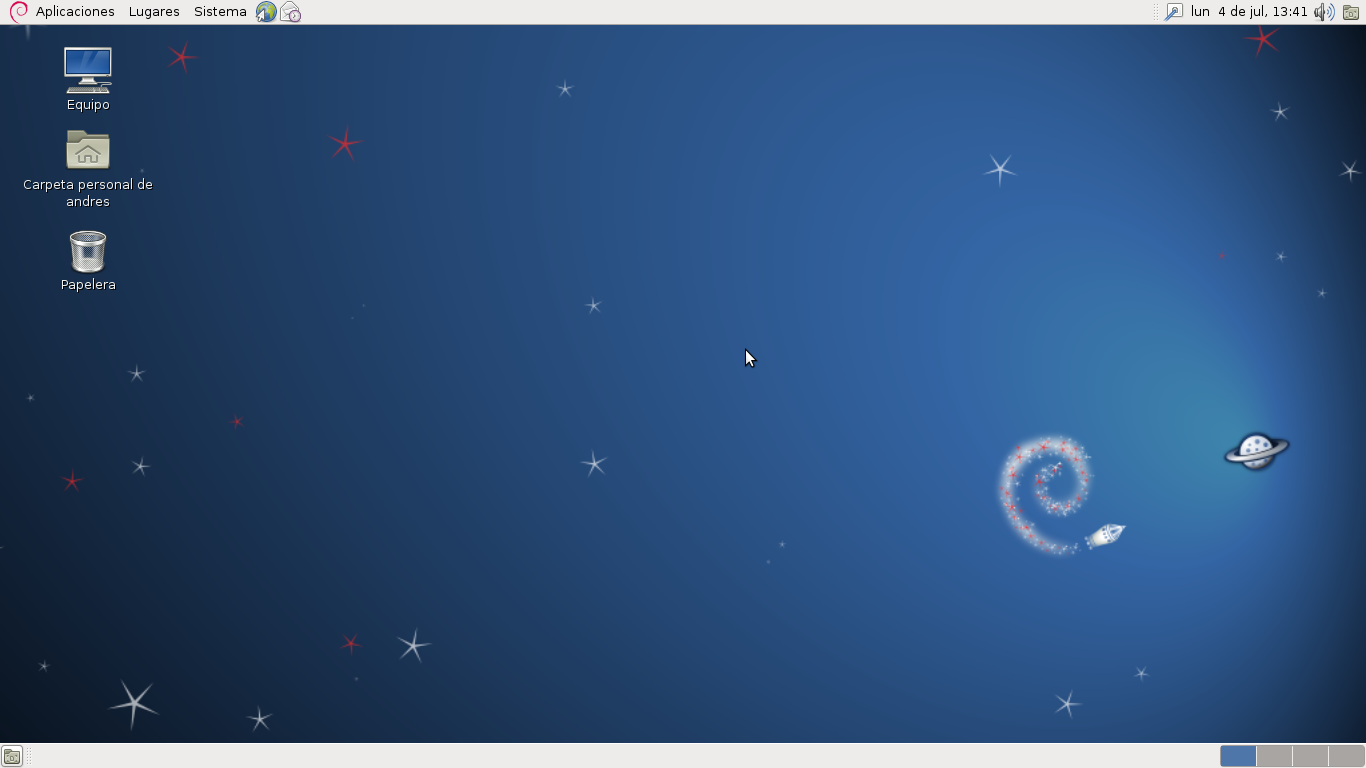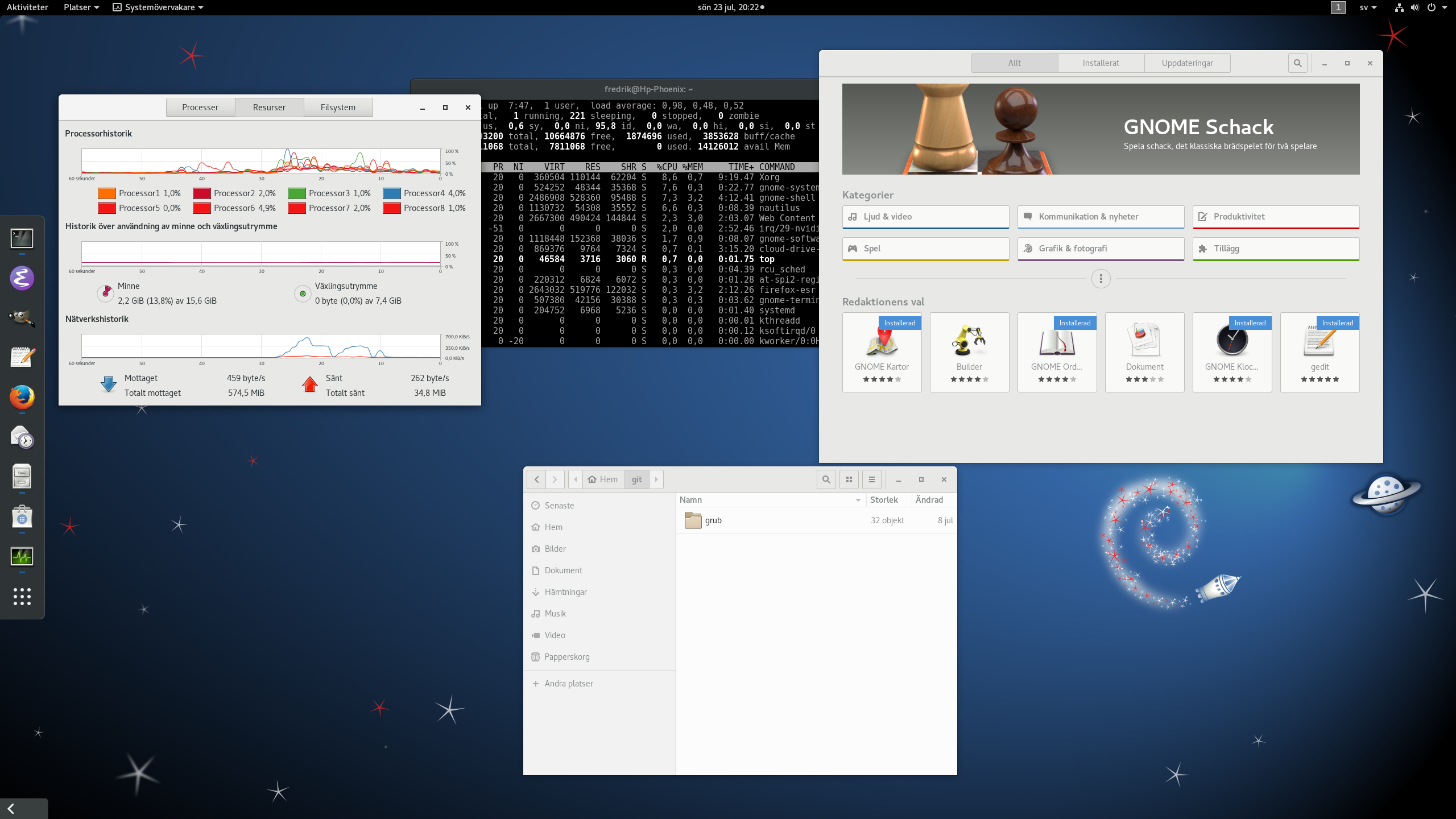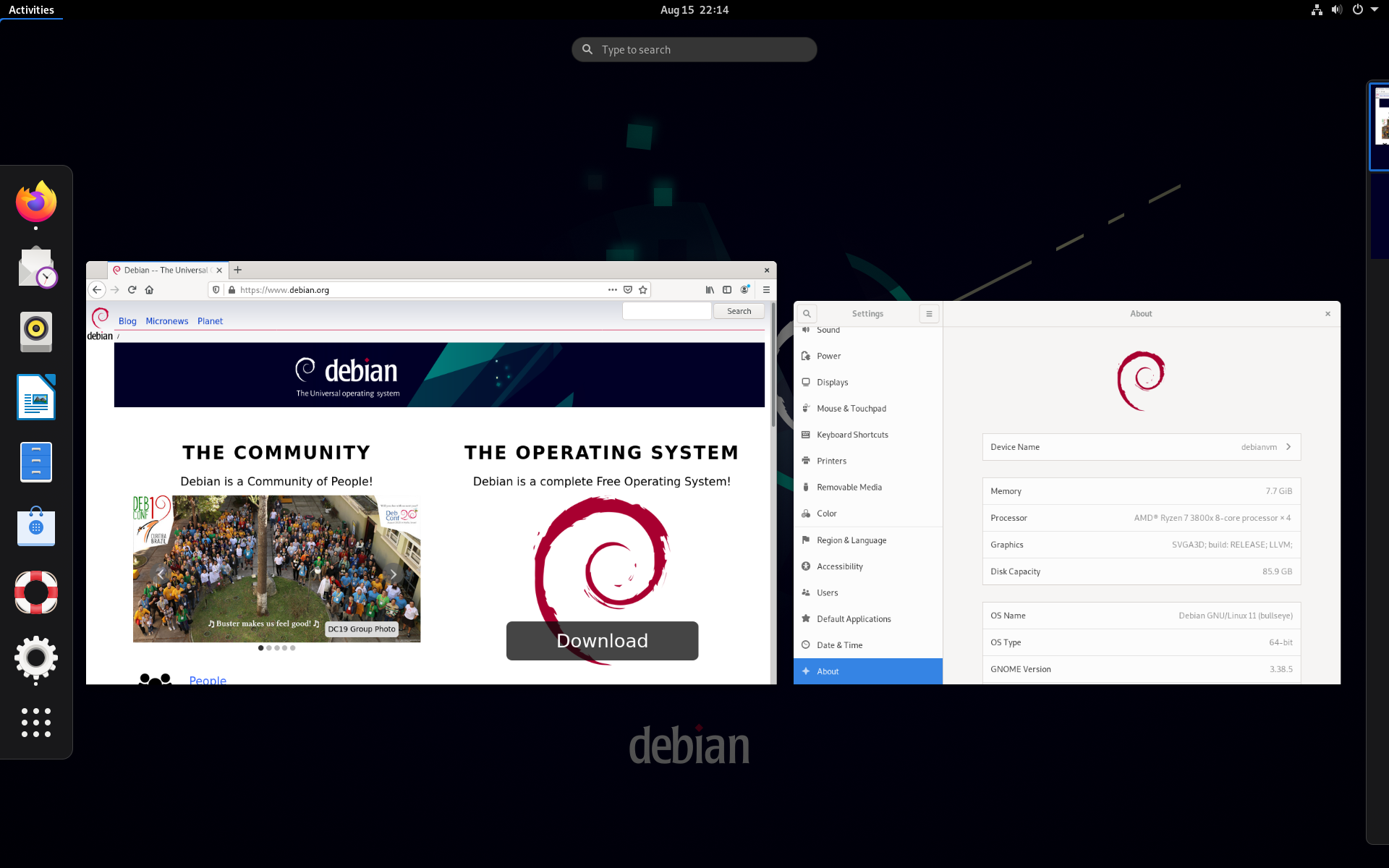Debian version history on:
[Wikipedia]
[Google]
[Amazon]


Debian
Debian (), also known as Debian GNU/Linux, is a Linux distribution composed of free and open-source software, developed by the community-supported Debian Project, which was established by Ian Murdock on August 16, 1993. The first version of D ...
releases do not follow a fixed schedule. Recent releases have been made roughly biennially by the Debian Project. The most recent version of Debian is Debian version 11, codename "Bullseye". The next up and coming release of Debian is Debian 12 codename "Bookworm".
Debian always has at least three release branches active at any time: "stable", "testing" and "unstable". The stable release is the most recent and up-to-date version of Debian. The testing release contains packages that have been tested from unstable. Testing has significantly more up-to-date packages than stable and is a close version of the future release candidate for stable. The unstable release (also known as sid) is the release where active development takes place. It is the most volatile version of Debian.
When the Debian stable branch is replaced with a newer release, the current stable becomes an "oldstable" release. When the Debian stable branch is replaced again, the oldstable release becomes the "oldoldstable" release. Oldoldstable is eventually moved to the archived releases repository.
Naming convention
Debian distribution codenames are based on the names of characters from the ''Toy Story
''Toy Story'' is a 1995 American computer-animated comedy film directed by John Lasseter (in his feature directorial debut), produced by Pixar Animation Studios and released by Walt Disney Pictures. The first installment in the '' Toy Story ...
'' films. Debian's ''unstable'' trunk is named after Sid, a character who regularly destroyed his toys.
Release history
Debian 1.0 was never released, as a vendor accidentally shipped a development release with that version number. The package management systemdpkg
dpkg is the software at the base of the package management system in the free operating system Debian and its numerous derivatives. dpkg is used to install, remove, and provide information about .deb packages.
dpkg (Debian Package) itself is ...
and its front-end dselect
dselect is a computer program used to manage software packages in the Debian operating system.
dselect is one of the oldest front-ends to dpkg, and the bulk of its development happened when it was originally written by Ian Jackson, who wrote ...
were developed and implemented on Debian in a previous release. A transition from the a.out binary format to the ELF
An elf () is a type of humanoid supernatural being in Germanic mythology and folklore. Elves appear especially in North Germanic mythology. They are subsequently mentioned in Snorri Sturluson's Icelandic Prose Edda. He distinguishes "ligh ...
binary format had already begun before the planned 1.0 release. The only supported architecture was Intel 80386
The Intel 386, originally released as 80386 and later renamed i386, is a 32-bit microprocessor introduced in 1985. The first versions had 275,000 transistorslibc6 and Debian was ported to the
 Debian 4.0 (''Etch''), released 8 April 2007, contained around 18,000 packages maintained by more than 1,030 developers. Debian was ported to
Debian 4.0 (''Etch''), released 8 April 2007, contained around 18,000 packages maintained by more than 1,030 developers. Debian was ported to
 Debian 5.0 (''Lenny''), released 14 February 2009, contained more than 23,000 packages. Debian was ported to the ARM EABI (armel) architecture.
Point releases:
*5.0.1 ()
*5.0.2 ()
*5.0.3 ()
*5.0.4 ()
*5.0.5 ()
*5.0.6 ()
*5.0.7 ()
*5.0.8 ()
*5.0.9 ()
*5.0.10 () this is the final update for codename Lenny.
Debian 5.0 (''Lenny''), released 14 February 2009, contained more than 23,000 packages. Debian was ported to the ARM EABI (armel) architecture.
Point releases:
*5.0.1 ()
*5.0.2 ()
*5.0.3 ()
*5.0.4 ()
*5.0.5 ()
*5.0.6 ()
*5.0.7 ()
*5.0.8 ()
*5.0.9 ()
*5.0.10 () this is the final update for codename Lenny.
 Debian 6.0 (''Squeeze''), released 6 February 2011, contained more than 29,000 packages. The default Linux kernel included was deblobbed beginning with this release. The web browser
Debian 6.0 (''Squeeze''), released 6 February 2011, contained more than 29,000 packages. The default Linux kernel included was deblobbed beginning with this release. The web browser
 Debian 7 (''Wheezy''), released 4 May 2013, contained more than 36,000 packages. Support for
Debian 7 (''Wheezy''), released 4 May 2013, contained more than 36,000 packages. Support for
 Debian 8 (''Jessie''), released 25 April 2015, contained more than 43,000 packages, with
Debian 8 (''Jessie''), released 25 April 2015, contained more than 43,000 packages, with
 Debian 9 (Stretch) was released on 17 June 2017, two years and two months after Debian 8.0, and contained more than 51,000 packages. The final minor update, called a "point release", is version 9.13, released on . Major upgrades include the
Debian 9 (Stretch) was released on 17 June 2017, two years and two months after Debian 8.0, and contained more than 51,000 packages. The final minor update, called a "point release", is version 9.13, released on . Major upgrades include the
 Debian 10 (Buster) was released on . It was two years and a month after Debian 9 (Stretch). Debian 10 contains 57,703 packages, supports
Debian 10 (Buster) was released on . It was two years and a month after Debian 9 (Stretch). Debian 10 contains 57,703 packages, supports
 Debian 11 (Bullseye) was released on 14 August 2021. It is based on the Linux 5.10 LTS kernel and will be supported for five years.
On 12 November 2020, it was announced that "Homeworld", by Juliette Taka, will be the default theme for Debian 11, after winning a public poll held with eighteen choices.
Bullseye dropped the remaining Qt4/KDE 4 libraries and Python 2.
and shipped with Qt 5.15 KDE Plasma 5.20. Available desktops include Gnome 3.38, KDE Plasma 5.20, LXDE 11, LXQt 0.16, MATE 1.24, and Xfce 4.16.
Bullseye does not support the older big-endian 32-bit MIPS architectures. This is not to be confused with the more common i386 32-bit architecture which is still supported.
The first of the code freezes, readying Debian 11 for release, began on 12 January 2021.
Development freeze timetable:
* January 12, 2021: transition freeze
* February 12, 2021: soft freeze
* March 12, 2021: hard freeze
* July 17, 2021: full freeze
* August 14, 2021: release
Point releases:
*11.1 ()
*11.2 ()
*11.3 ()
*11.4 ()
*11.5 ()
*11.6 ()
Debian 11 (Bullseye) was released on 14 August 2021. It is based on the Linux 5.10 LTS kernel and will be supported for five years.
On 12 November 2020, it was announced that "Homeworld", by Juliette Taka, will be the default theme for Debian 11, after winning a public poll held with eighteen choices.
Bullseye dropped the remaining Qt4/KDE 4 libraries and Python 2.
and shipped with Qt 5.15 KDE Plasma 5.20. Available desktops include Gnome 3.38, KDE Plasma 5.20, LXDE 11, LXQt 0.16, MATE 1.24, and Xfce 4.16.
Bullseye does not support the older big-endian 32-bit MIPS architectures. This is not to be confused with the more common i386 32-bit architecture which is still supported.
The first of the code freezes, readying Debian 11 for release, began on 12 January 2021.
Development freeze timetable:
* January 12, 2021: transition freeze
* February 12, 2021: soft freeze
* March 12, 2021: hard freeze
* July 17, 2021: full freeze
* August 14, 2021: release
Point releases:
*11.1 ()
*11.2 ()
*11.3 ()
*11.4 ()
*11.5 ()
*11.6 ()
Debian Releases
at Debian Wiki
Debian Releases
at debian.org * {{Use dmy dates, date=September 2018 Debian Lists of operating systems Software version histories
Motorola 68000 series
The Motorola 68000 series (also known as 680x0, m68000, m68k, or 68k) is a family of 32-bit complex instruction set computer (CISC) microprocessors. During the 1980s and early 1990s, they were popular in personal computers and workstations and w ...
(m68k) architectures.
Point releases:
* 2.0r1 ()
* 2.0r2 ()
* 2.0r3 ()
* 2.0r4 ()
* 2.0r5 ()
Debian 2.1 (Slink)
Debian 2.1 (''Slink''), released 9 March 1999, contained about 2,250 packages. The front-endAPT
Apt. is an abbreviation for apartment.
Apt may also refer to:
Places
* Apt Cathedral, a former cathedral, and national monument of France, in the town of Apt in Provence
* Apt, Vaucluse, a commune of the Vaucluse département of France
* A ...
was introduced for the package management system and Debian was ported to Alpha
Alpha (uppercase , lowercase ; grc, ἄλφα, ''álpha'', or ell, άλφα, álfa) is the first letter of the Greek alphabet. In the system of Greek numerals, it has a value of one. Alpha is derived from the Phoenician letter aleph , whic ...
and SPARC
SPARC (Scalable Processor Architecture) is a reduced instruction set computer (RISC) instruction set architecture originally developed by Sun Microsystems. Its design was strongly influenced by the experimental Berkeley RISC system developed ...
.
Point releases:
* 2.1r1 (Possibly never released)
* 2.1r2 ()
* 2.1r3 ()
* 2.1r4 ()
* 2.1r5 ()
Debian 2.2 (Potato)
Debian 2.2 (''Potato''), released 14–15 August 2000, contained 2,600 packages maintained by more than 450 developers. New packages included thedisplay manager
In the X Window System, an X display manager is a graphical login manager which starts a login session on an X server from the same or another computer.
A display manager presents the user with a login screen. A session starts when a user s ...
GDM, the directory service
In computing, a directory service or name service maps the names of network resources to their respective network addresses. It is a shared information infrastructure for locating, managing, administering and organizing everyday items and network r ...
OpenLDAP
OpenLDAP is a free, open-source implementation of the Lightweight Directory Access Protocol (LDAP) developed by the OpenLDAP Project. It is released under its own BSD-style license called the OpenLDAP Public License.
LDAP is a platform-independe ...
, the security software
Computer security software or cybersecurity software is any computer program designed to influence information security. This is often taken in the context of defending computer systems or data, yet can incorporate programs designed specifically ...
OpenSSH
OpenSSH (also known as OpenBSD Secure Shell) is a suite of secure networking utilities based on the Secure Shell (SSH) protocol, which provides a secure channel over an unsecured network in a client–server architecture.
Network Working Gro ...
and the mail transfer agent
The mail or post is a system for physically transporting postcards, letters, and parcels. A postal service can be private or public, though many governments place restrictions on private systems. Since the mid-19th century, national postal syst ...
Postfix. Debian was ported to the PowerPC
PowerPC (with the backronym Performance Optimization With Enhanced RISC – Performance Computing, sometimes abbreviated as PPC) is a reduced instruction set computer (RISC) instruction set architecture (ISA) created by the 1991 Apple Inc., App ...
and ARM
In human anatomy, the arm refers to the upper limb in common usage, although academically the term specifically means the upper arm between the glenohumeral joint (shoulder joint) and the elbow joint. The distal part of the upper limb between th ...
architectures.
Point releases:
* 2.2r1 ()
* 2.2r2 ()
* 2.2r3 ()
* 2.2r4 ()
* 2.2r5 ()
* 2.2r6 ()
* 2.2r7 ()
Debian 3.0 (Woody)
Debian 3.0 (''Woody''), released 19 July 2002, contained around 8,500 packages maintained by more than 900 developers.KDE
KDE is an international free software community that develops free and open-source software. As a central development hub, it provides tools and resources that allow collaborative work on this kind of software. Well-known products include the ...
was introduced and Debian was ported to the following architectures: IA-64
IA-64 (Intel Itanium architecture) is the instruction set architecture (ISA) of the Itanium family of 64-bit Intel microprocessors. The basic ISA specification originated at Hewlett-Packard (HP), and was subsequently implemented by Intel in coll ...
, PA-RISC
PA-RISC is an instruction set architecture (ISA) developed by Hewlett-Packard. As the name implies, it is a reduced instruction set computer (RISC) architecture, where the PA stands for Precision Architecture. The design is also referred to as ...
(hppa), mips and mipsel and IBM ESA/390 (s390).
Point releases:
* 3.0r1 ()
* 3.0r2 ()
* 3.0r3 ()
* 3.0r4 ()
* 3.0r5 ()
* 3.0r6 ()
Debian 3.1 (Sarge)
Debian 3.1 (''Sarge''), released 6 June 2005, contained around 15,400 packages.debian-installer
Debian-Installer is a system installer designed for the Debian Linux distribution. It originally appeared in the Debian release 3.1 (Sarge), released on June 6, 2005, although the first release of a Linux distribution that used it was Skolelinux ...
and OpenOffice.org
OpenOffice.org (OOo), commonly known as OpenOffice, is a discontinued open-source office suite. Active successor projects include LibreOffice (the most actively developed), Apache OpenOffice, Collabora Online (enterprise ready LibreOffice) a ...
were introduced.
Point releases:
* 3.1r1 ()
* 3.1r2 ()
* 3.1r3 ()
* 3.1r4 ()
* 3.1r5 ()
* 3.1r6 ()
* 3.1r7 ()
* 3.1r8 () this is the final update for codename Sarge.
Debian 4.0 (Etch)
 Debian 4.0 (''Etch''), released 8 April 2007, contained around 18,000 packages maintained by more than 1,030 developers. Debian was ported to
Debian 4.0 (''Etch''), released 8 April 2007, contained around 18,000 packages maintained by more than 1,030 developers. Debian was ported to x86-64
x86-64 (also known as x64, x86_64, AMD64, and Intel 64) is a 64-bit version of the x86 instruction set, first released in 1999. It introduced two new modes of operation, 64-bit mode and compatibility mode, along with a new 4-level paging mod ...
(amd64) and support for the Motorola 68000 series
The Motorola 68000 series (also known as 680x0, m68000, m68k, or 68k) is a family of 32-bit complex instruction set computer (CISC) microprocessors. During the 1980s and early 1990s, they were popular in personal computers and workstations and w ...
(m68k) architecture was dropped. This version introduced utf-8 and udev
udev (userspace ) is a device manager for the Linux kernel. As the successor of devfsd and hotplug, udev primarily manages device nodes in the directory. At the same time, udev also handles all user space events raised when hardware devices ...
device management by default.
Point releases:
*4.0r1 ()
*4.0r2 ()
*4.0r3 ()
*4.0r4 ()
*4.0r5 ()
*4.0r6 ()
*4.0r7 ()
*4.0r8 ()
*4.0r9 () this is the final update for codename Etch
Debian 5.0 (Lenny)
 Debian 5.0 (''Lenny''), released 14 February 2009, contained more than 23,000 packages. Debian was ported to the ARM EABI (armel) architecture.
Point releases:
*5.0.1 ()
*5.0.2 ()
*5.0.3 ()
*5.0.4 ()
*5.0.5 ()
*5.0.6 ()
*5.0.7 ()
*5.0.8 ()
*5.0.9 ()
*5.0.10 () this is the final update for codename Lenny.
Debian 5.0 (''Lenny''), released 14 February 2009, contained more than 23,000 packages. Debian was ported to the ARM EABI (armel) architecture.
Point releases:
*5.0.1 ()
*5.0.2 ()
*5.0.3 ()
*5.0.4 ()
*5.0.5 ()
*5.0.6 ()
*5.0.7 ()
*5.0.8 ()
*5.0.9 ()
*5.0.10 () this is the final update for codename Lenny.
Debian 6.0 (Squeeze)
 Debian 6.0 (''Squeeze''), released 6 February 2011, contained more than 29,000 packages. The default Linux kernel included was deblobbed beginning with this release. The web browser
Debian 6.0 (''Squeeze''), released 6 February 2011, contained more than 29,000 packages. The default Linux kernel included was deblobbed beginning with this release. The web browser Chromium
Chromium is a chemical element with the symbol Cr and atomic number 24. It is the first element in group 6. It is a steely-grey, lustrous, hard, and brittle transition metal.
Chromium metal is valued for its high corrosion resistance and hardne ...
was introduced and Debian was ported to the kfreebsd-i386 and kfreebsd-amd64 architectures (while that port was later discontinued), and support for the Intel 486
The Intel 486, officially named i486 and also known as 80486, is a microprocessor. It is a higher-performance follow-up to the Intel 386. The i486 was introduced in 1989. It represents the fourth generation of binary compatible CPUs following the ...
, Alpha
Alpha (uppercase , lowercase ; grc, ἄλφα, ''álpha'', or ell, άλφα, álfa) is the first letter of the Greek alphabet. In the system of Greek numerals, it has a value of one. Alpha is derived from the Phoenician letter aleph , whic ...
, and PA-RISC
PA-RISC is an instruction set architecture (ISA) developed by Hewlett-Packard. As the name implies, it is a reduced instruction set computer (RISC) architecture, where the PA stands for Precision Architecture. The design is also referred to as ...
(hppa) architectures was dropped.
Squeeze was the first release of Debian in which non-free firmware components (aka "binary blobs") were excluded from the "main" repository as a matter of policy.
Point releases:
*6.0.1 ()
*6.0.2 ()
*6.0.3 ()
*6.0.4 ()
*6.0.5 ()
*6.0.6 ()
*6.0.7 ()
*6.0.8 ()
*6.0.9 ()
*6.0.10 () this is the final update for codename Squeeze.
*Squeeze long term support reaches end-of-life ()
Debian 7 (Wheezy)
 Debian 7 (''Wheezy''), released 4 May 2013, contained more than 36,000 packages. Support for
Debian 7 (''Wheezy''), released 4 May 2013, contained more than 36,000 packages. Support for UEFI
UEFI (Unified Extensible Firmware Interface) is a set of specifications written by the UEFI Forum. They define the architecture of the platform firmware used for booting and its interface for interaction with the operating system. Examples of ...
was added and Debian was ported to the armhf
ARM (stylised in lowercase as arm, formerly an acronym for Advanced RISC Machines and originally Acorn RISC Machine) is a family of reduced instruction set computer (RISC) instruction set architectures for computer processors, configured ...
and IBM ESA/390 (s390x) architectures.
Point releases:
*7.1 ()
*7.2 ()
*7.3 ()
*7.4 ()
*7.5 ()
*7.6 ()
*7.7 ()
*7.8 ()
*Debian 8.0 codename Jessie releases, Wheezy becomes oldstable ()
*7.9 ()
*7.10 ()
*7.11 () this is the final update for codename Wheezy.
*Debian 9.0 codename Stretch releases, Wheezy becomes oldoldstable ()
*Wheezy long term support reached end-of-life ()
*Wheezy extended long term support reached end-of-life ().
Debian 8 (Jessie)
 Debian 8 (''Jessie''), released 25 April 2015, contained more than 43,000 packages, with
Debian 8 (''Jessie''), released 25 April 2015, contained more than 43,000 packages, with systemd
systemd is a software suite that provides an array of system components for Linux operating systems. Its main aim is to unify service configuration and behavior across Linux distributions; Its primary component is a "system and service manager ...
installed by default instead of init
In Unix-based computer operating systems, init (short for ''initialization'') is the first process started during booting of the computer system. Init is a daemon process that continues running until the system is shut down. It is the direct ...
. ( sysvinit and upstart packages are provided as alternatives.) Debian was ported to the ARM64
AArch64 or ARM64 is the 64-bit extension of the ARM architecture family.
It was first introduced with the Armv8-A architecture. Arm releases a new extension every year.
ARMv8.x and ARMv9.x extensions and features
Announced in October 2011, AR ...
and ppc64
ppc64 is an identifier commonly used within the Linux, GNU Compiler Collection (GCC) and LLVM open-source software communities to refer to the target computer architecture, architecture for applications optimized for 64-bit big-endian PowerPC an ...
le architectures, while support for the IA-64
IA-64 (Intel Itanium architecture) is the instruction set architecture (ISA) of the Itanium family of 64-bit Intel microprocessors. The basic ISA specification originated at Hewlett-Packard (HP), and was subsequently implemented by Intel in coll ...
, kfreebsd-amd64 and kfreebsd-i386, IBM ESA/390 (s390) (only the 31-bit variant; the newer 64-bit
In computer architecture, 64-bit Integer (computer science), integers, memory addresses, or other Data (computing), data units are those that are 64 bits wide. Also, 64-bit central processing unit, CPUs and arithmetic logic unit, ALUs are those ...
s390x
Linux on IBM Z or Linux on zSystems is the collective term for the Linux operating system compiled to run on IBM mainframes, especially IBM Z / IBM zSystems and IBM LinuxONE servers. Similar terms which imply the same meaning are ''Linux/390'', ...
was retained) and SPARC
SPARC (Scalable Processor Architecture) is a reduced instruction set computer (RISC) instruction set architecture originally developed by Sun Microsystems. Its design was strongly influenced by the experimental Berkeley RISC system developed ...
architectures were dropped.
Long term support ended June 2020.
Point releases:
*8.1 ()
*8.2 ()
*8.3 ()
*8.4 ()
*8.5 ()
*8.6 ()
*8.7 ()
*8.8 ()
* Debian 9.0 codename Stretch releases, Jessie becomes oldstable ()
*8.9 ()
*8.10 ()
*Regular security support updates have been discontinued ()
*8.11 () this is the final update for codename Jessie.
*Debian 10.0 codename Buster releases, Jessie becomes oldoldstable ()
*Jessie long term support reaches end-of-life ()
*Jessie extended long term support reaches end-of-life ()
Debian 9 (Stretch)
 Debian 9 (Stretch) was released on 17 June 2017, two years and two months after Debian 8.0, and contained more than 51,000 packages. The final minor update, called a "point release", is version 9.13, released on . Major upgrades include the
Debian 9 (Stretch) was released on 17 June 2017, two years and two months after Debian 8.0, and contained more than 51,000 packages. The final minor update, called a "point release", is version 9.13, released on . Major upgrades include the Linux kernel
The Linux kernel is a free and open-source, monolithic, modular, multitasking, Unix-like operating system kernel. It was originally authored in 1991 by Linus Torvalds for his i386-based PC, and it was soon adopted as the kernel for the GNU ope ...
going from version 3.16 to 4.9, GNOME
A gnome is a mythological creature and diminutive spirit in Renaissance magic and alchemy, first introduced by Paracelsus in the 16th century and later adopted by more recent authors including those of modern fantasy literature. Its characte ...
desktop version going from 3.14 to 3.22, KDE Plasma 4
KDE Plasma 4 was the fourth generation of the KDE workspace environments. It consisted of three workspaces, each targeting a certain platform: ''Plasma Desktop'' for traditional desktop PCs and Notebook (computer), notebooks, ''Plasma Netbook'' fo ...
was upgraded to Plasma 5
KDE Plasma 5 is the fifth and current generation of the graphical workspaces environment created by KDE primarily for Linux systems. KDE Plasma 5 is the successor of KDE Plasma 4 and was first released on 15 July 2014.
It includes a new defaul ...
, LibreOffice
LibreOffice () is a free and open-source productivity software, office productivity software suite, a project of The Document Foundation (TDF). It was fork (software development), forked in 2010 from OpenOffice.org, an open-sourced version of t ...
4.3 upgraded to 5.2 and Qt upgraded from 4.8 to 5.7. LXQt
LXQt is a free and open source lightweight desktop environment. It was formed from the merger of the LXDE and Razor-qt projects.
Like its GTK predecessor LXDE, LXQt does not ship or develop its own window manager, instead LXQt lets the user ...
has been added as well.
The Intel i586 (Pentium), i586/i686 hybrid and PowerPC
PowerPC (with the backronym Performance Optimization With Enhanced RISC – Performance Computing, sometimes abbreviated as PPC) is a reduced instruction set computer (RISC) instruction set architecture (ISA) created by the 1991 Apple Inc., App ...
architectures are no longer supported as of Stretch.
Point releases:
*9.1 ()
*9.2 ()
*9.3 ()
*9.4 ()
*9.5 ()
*9.6 ()
*9.7 ()
*9.8 ()
*9.9 ()
*Stretch becomes oldstable, Buster becomes stable release ()
*9.10 ()
*9.11 ()
*9.12 ()
*9.13 () this is the final update for codename Stretch.
*Stretch long term support reaches end-of-life ()
*Stretch extended long term support reaches end-of-life ()
Debian 10 (Buster)
 Debian 10 (Buster) was released on . It was two years and a month after Debian 9 (Stretch). Debian 10 contains 57,703 packages, supports
Debian 10 (Buster) was released on . It was two years and a month after Debian 9 (Stretch). Debian 10 contains 57,703 packages, supports UEFI Secure Boot
UEFI (Unified Extensible Firmware Interface) is a set of specifications written by the UEFI Forum. They define the architecture of the platform firmware used for booting and its interface for interaction with the operating system. Examples of ...
, has AppArmor
AppArmor ("Application Armor") is a Linux kernel security module that allows the system administrator to restrict programs' capabilities with per-program profiles. Profiles can allow capabilities like network access, raw socket access, and the ...
enabled by default, uses LUKS2 as the default LUKS format, and uses Wayland for GNOME by default.
Debian 10 ships with Linux kernel version 4.19. Available desktops include Cinnamon 3.8, GNOME 3.30, KDE Plasma 5.14, LXDE 0.99.2, LXQt 0.14, MATE 1.20, Xfce 4.12. Key application software
Application may refer to:
Mathematics and computing
* Application software, computer software designed to help the user to perform specific tasks
** Application layer, an abstraction layer that specifies protocols and interface methods used in a c ...
includes LibreOffice 6.1 for office productivity, VLC 3.0 for media viewing, and Firefox ESR
Mozilla Firefox, or simply Firefox, is a Free and open-source software, free and open-source web browser developed by the Mozilla Foundation and its subsidiary, the Mozilla Corporation. It uses the Gecko (software), Gecko Browser engine, rend ...
for web browsing.
Point releases:
*10.1 ()
*10.2 ()
*10.3 ()
*10.4 ()
*10.5 ()
*10.6 ()
*10.7 ()
*10.8 ()
*10.9 ()
*10.10 ()
*Buster becomes oldstable, Bullseye is the current stable release ()
*10.11 ()
*10.12 ()
*10.13 () this is the final update for codename Buster
*
Debian 11 (Bullseye)
 Debian 11 (Bullseye) was released on 14 August 2021. It is based on the Linux 5.10 LTS kernel and will be supported for five years.
On 12 November 2020, it was announced that "Homeworld", by Juliette Taka, will be the default theme for Debian 11, after winning a public poll held with eighteen choices.
Bullseye dropped the remaining Qt4/KDE 4 libraries and Python 2.
and shipped with Qt 5.15 KDE Plasma 5.20. Available desktops include Gnome 3.38, KDE Plasma 5.20, LXDE 11, LXQt 0.16, MATE 1.24, and Xfce 4.16.
Bullseye does not support the older big-endian 32-bit MIPS architectures. This is not to be confused with the more common i386 32-bit architecture which is still supported.
The first of the code freezes, readying Debian 11 for release, began on 12 January 2021.
Development freeze timetable:
* January 12, 2021: transition freeze
* February 12, 2021: soft freeze
* March 12, 2021: hard freeze
* July 17, 2021: full freeze
* August 14, 2021: release
Point releases:
*11.1 ()
*11.2 ()
*11.3 ()
*11.4 ()
*11.5 ()
*11.6 ()
Debian 11 (Bullseye) was released on 14 August 2021. It is based on the Linux 5.10 LTS kernel and will be supported for five years.
On 12 November 2020, it was announced that "Homeworld", by Juliette Taka, will be the default theme for Debian 11, after winning a public poll held with eighteen choices.
Bullseye dropped the remaining Qt4/KDE 4 libraries and Python 2.
and shipped with Qt 5.15 KDE Plasma 5.20. Available desktops include Gnome 3.38, KDE Plasma 5.20, LXDE 11, LXQt 0.16, MATE 1.24, and Xfce 4.16.
Bullseye does not support the older big-endian 32-bit MIPS architectures. This is not to be confused with the more common i386 32-bit architecture which is still supported.
The first of the code freezes, readying Debian 11 for release, began on 12 January 2021.
Development freeze timetable:
* January 12, 2021: transition freeze
* February 12, 2021: soft freeze
* March 12, 2021: hard freeze
* July 17, 2021: full freeze
* August 14, 2021: release
Point releases:
*11.1 ()
*11.2 ()
*11.3 ()
*11.4 ()
*11.5 ()
*11.6 ()
Debian 12 (Bookworm)
Debian 12 (Bookworm) is the current testing release of Debian and is the next release candidate for Debian. Debian 12 is expected to havelink-time optimization
Interprocedural optimization (IPO) is a collection of compiler techniques used in computer programming to improve performance in programs containing many frequently used functions of small or medium length. IPO differs from other compiler optimiz ...
(LTO) enabled by default.
Debian 12 might reduce focus on i386 support, though this has yet to be determined.
Release table
When a release transitions to long-term support phase (LTS-phase), security is no longer handled by the main Debian security team. Only a subset of Debian architectures are eligible for Long Term Support, and there is no support for packages in backports.Release timeline
Port timeline
Many of past architectures, plus some that have not yet achieved release status, are available from the ''debian-ports'' repository.See also
* Summary of Debian version history *Ubuntu version history
Ubuntu releases are made semiannually by Canonical Ltd, the developers of the Ubuntu operating system, using the year and month of the release as a version number. The first Ubuntu release, for example, was Ubuntu 4.10 and was released on 20 O ...
* Linux Mint version history
References
External links
Debian Releases
at Debian Wiki
Debian Releases
at debian.org * {{Use dmy dates, date=September 2018 Debian Lists of operating systems Software version histories